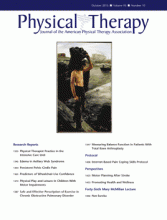Abstract
Background Exercise is recommended for people with an acute exacerbation of chronic obstructive pulmonary disease (AECOPD), yet there is little information to guide safe and effective mobilization and exercise for these patients.
Objectives The purpose of this study was to develop a clinical decision-making tool to guide health care professionals in the assessment, prescription, monitoring, and progression of mobilization and therapeutic exercise for patients with AECOPD.
Design and Methods A 3-round interdisciplinary Delphi panel identified and selected items based on a preselected consensus of 80%. These items were summarized in a paper-based tool titled Mobilization in Acute Exacerbations of Chronic Obstructive Pulmonary Disease (AECOPD-Mob). Focus groups and questionnaires were subsequently used to conduct a sensibility evaluation of the tool.
Results Nine researchers, 13 clinicians, and 7 individuals with COPD identified and approved 110 parameters for safe and effective exercise in AECOPD. These parameters were grouped into 5 categories: (1) “What to Assess Prior to Mobilization,” (2) “When to Consider Not Mobilizing or to Discontinue Mobilization,” (3) “What to Monitor During Mobilization for Patient Safety,” (4) “How to Progress Mobilization to Enhance Effectiveness,” and (5) “What to Confirm Prior to Discharge.” The tool was evaluated in 4 focus groups of 18 health care professionals, 90% of whom reported the tool was easy to use, was concise, and would guide a health care professional who is new to the acute care setting and working with patients with AECOPD.
Limitations The tool was developed based on published evidence and expert opinion, so the applicability of the items to patients in all settings cannot be guaranteed. The Delphi panel consisted of health care professionals from Canada, so items may not be generalizable to other jurisdictions.
Conclusions The AECOPD-Mob provides practical and concise information on safe and effective exercise for the AECOPD population for use by the new graduate or novice acute care practitioner.
Footnotes
Dr Camp, Dr Reid, Mr Chung, Dr Brooks, Dr Goodridge, Dr Marciniuk, and Ms Hoens provided concept/idea/research design. Dr Camp, Mr Chung, Dr Goodridge, Dr Reid, and Ms Hoens provided writing. Dr Camp, Ms Kirkham, and Ms Hoens provided data collection. Dr Camp, Dr Reid, Ms Kirkham, Mr Chung, and Ms Hoens provided data analysis. Dr Camp and Ms Hoens provided project management and institutional liaisons. Dr Camp, Dr Reid, and Ms Hoens provided fund procurement. Dr Camp, Mr Chung, and Ms Hoens provided participants and facilities/equipment. Ms Kirkham provided administrative support. Dr Reid, Mr Chung, Ms Kirkham, Dr Brooks, Dr Marciniuk, and Ms Hoens provided consultation (including review of manuscript before submission).
The authors acknowledge Christen Chan, Cristiane Yamabayashi, and Andrea Neufeld and master of physical therapy students Colin Beattie, Paramjot Bakshi, Tae il Yoon, Debbie Kan, Kayla Comstock, Lauren Courtice, Kira Frew, Monica Jochlin, and Mallory White, who assisted with data collection and analysis of the Delphi panel first-round data and the facilitation and analysis of the focus groups' data. The authors also acknowledge the Physiotherapy Association of British Columbia and the COPD Canada Patient Network for their support of this study and for assistance in recruiting panel participants.
Dr Camp is a Michael Smith Foundation of Health Research Scholar.
Ethical approval for the study was granted by the Providence Health Research Institute/University of British Columbia Research Ethics Board (UBC H10-01134) and the Fraser Health Authority (2013-110).
A grant from the Canadian Institutes of Health Research (CIHR No: 226908) funded the study.
- Received December 2, 2014.
- Accepted April 2, 2015.












